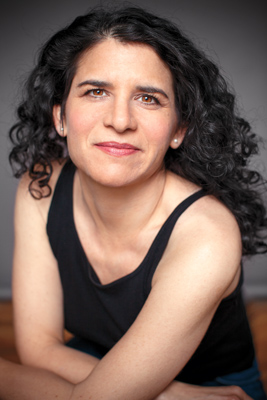Reviewed by Catherine Newman ’90
Maybe One Day is the ninth book by the wildly popular young-adult novelist Melissa Kantor ’91.
[Fiction] The summer before their sophomore year of high school, Olivia and Zoe, best friends since forever, are kicked out of the New York Ballet Company, where they’ve been dancing seriously for years. The girls, devastated, know one thing for sure: “This is the worst thing that will ever happen.”
And it is! The end.
Oh, wait. It’s actually not. That is just the prologue of Maybe One Day, a book that compares itself to the famously, epically tragic young-adult bestseller The Fault in Our Stars. (“That comparison gives me such a doomed feeling,” explains 14-year-old Ava, a family friend, when I show her my copy. “Also that the back cover uses the expression ‘the agony of loss.’” Points well taken.)

Kantor majored in English and political science at Amherst.
Now it’s fall of their junior year, and Liv and Zoe’s typical teenaged habitat of cute boys, annoying cheerleaders and locker-side banter is blasted almost immediately apart with the news that Olivia has cancer. Acute myeloid leukemia, to be exact. “I have old-man cancer,” she says to Zoe, tragicomically. “Isn’t that so humiliating?”
Zoe, our narrator, is the dark-haired, cynical foil to her sunny, blond best friend. She’s smart, self-ironic and just barely snarky—the kind of teenager who describes a boy as “nerdalicious,” is irritated by the incorrect usage of the word “literally” and muses, “That my best friend regularly hung out with cheerleaders was one of the great mysteries of my life.”
Now, with Olivia sick, Zoe is bereft. Theirs is one of the great girlhood passions—the kind where you can pack a suitcase for your friend in the hospital because you know the provenance and exact degree of likedness of her every garment. (“I love that part,” says our friend Ava. “Them sharing all their clothes—that all the parts of what she was wearing she bought with Olivia, except her underwear—that felt totally believable.”) Zoe’s mom has always said the girls look like salt and pepper shakers—light and dark versions of the same person. “And now here I was, just a stupid, lonely pepper shaker. What was the point of a pepper shaker without a salt shaker? I didn’t even like pepper.”
In a perfect, heartbreaking detail, the girls switch their customary phone sign-off from “love ya” to “I love you.” For Zoe, a precocious awareness is dawning: the ordinary is precious. The ordinary is also, in the context of a sick best friend, bizarre. After she and some classmates discuss an especially good salad at school, Zoe says, “Even though Olivia was dying, we still ate lunch.”
The book gracefully navigates a number of subplots: In one, Zoe agrees to take over Liv’s dance class for at-risk girls at the local rec center—an experience that, predictably, has much to teach her about herself. In another, Zoe falls for the very boy whom Olivia likes, and romance—even a little escapist sexuality—ensues. More broadly, Zoe, mildly misanthropic, is compelled to recognize the essential goodness of nearly everyone, from her annoyingly groovy but profoundly supportive parents, to the bighearted cheer squad she has so enjoyed making fun of. “These were good people,” she observes, poignantly, at a fundraising carwash they’ve organized. “These were Olivia’s people.”
Alas, Olivia’s cancer proceeds apace, and her treatment spans from chemo to a bone marrow transplant, with details that feel informative without ever becoming excessively graphic. There has been some imaginary controversy of late about a so-called “new” genre of literature about sick kids—The Fault in Our Stars may be the paradigm—but, honestly? It’s hardly new. Or, rather, teenagers’ interest in illness and loss has been around at least since I was in eighth grade devouring John Gunther’s Death Be Not Proud and experiencing a kind of cathartic grown-up-ness: I dipped my vicarious toe in the water of loss and understood, for literally the very first time, how much there might be in life to lose. I would have loved Maybe One Day; I would have wanted my best friend to read it too.
Catherine Newman ’90 writes an advice column for Real Simple and blogs at benandbirdy.blogspot.com.